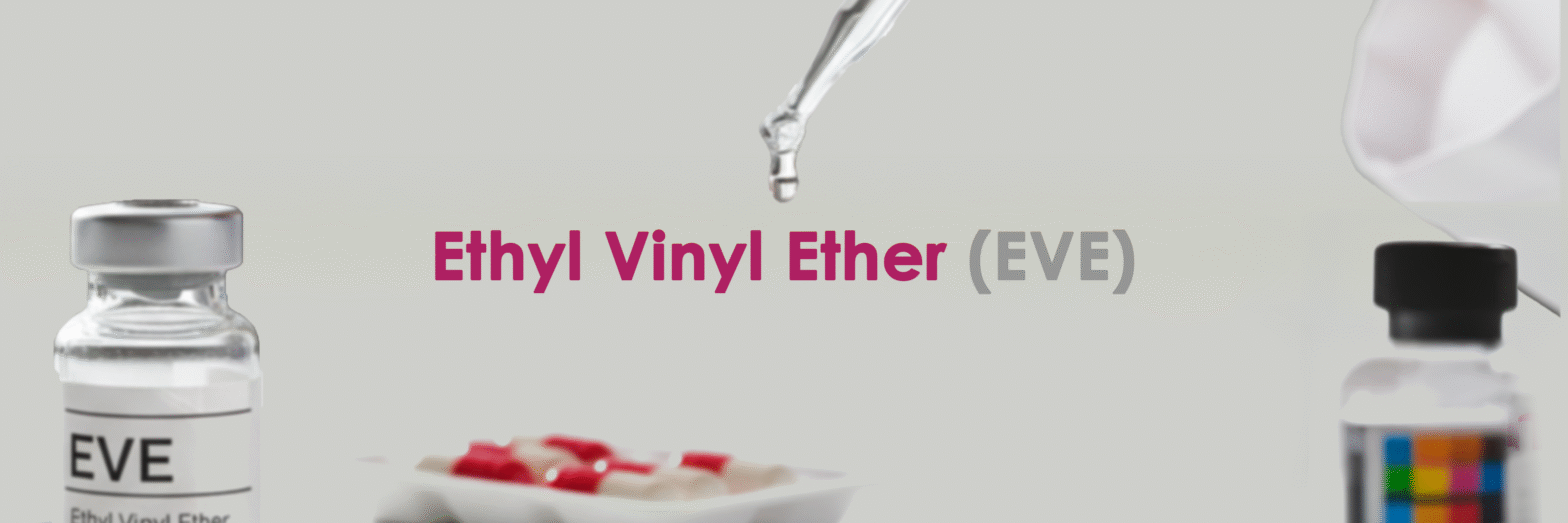INTRODUCTION
Ethyl vinyl ether is a reactive, flammable, volatile liquid with a strong ether-like odor. Featuring two conjugated functional groups—an ether and an alkene—this molecule act as important building block, especially in polymer synthesis. Its applications span multiple industrial sectors, including semiconductors, coatings, inks, fragrances, adhesives, paints, oil viscosity modifiers and pharmaceuticals, with promising potential as a dietary supplement.
Manufacture
i) EVE can be synthesized through the base-catalyzed reaction of acetylene and ethanol- Reppe method,
ii) Dehydration of ethylene glycol mono-ethyl ether using silica supported potassium phosphate,
iii) Transvinylation of vinyl phenyl ether and
iv) Vinylation of ethanol using 10-vinylphenothiazine are the few common methods available to prepare ethyl vinyl ether.
| Synonyms | Ethoxyethylene, Vinamar |
| CAS no. | 109-92-2 |
| EINECS no. | 203-718-4 |
| Molecular formula | C4H8O |
| Molecular weight | 72.11 |
| Structure |  |
Applications
Ethyl vinyl ether is a key monomer and versatile intermediate in organic chemistry. The main areas of application include:
| Polymer Chemistry: |
| Used to prepare poly(ethyl vinyl ether) and copolymers with maleic anhydride, acrylates, or vinyl esters. These copolymers find applications in: adhesives & coatings, dispersants, personal care and cosmetic formulations. Certain derivatives of EVE-based copolymers are used in photoresist formulations for semiconductor industries. |
| Pharmaceutical & Fine Chemicals: |
| Serves as a building block in the synthesis of heterocycles, pharmaceuticals, and active pharmaceutical ingredients (APIs). Also, EVE is widely used as a reagent to introduce vinyl ether protecting groups for aldehydes and ketones, forming acetals that can later be removed under mild acidic conditions. |
| Substrate for various organic reactions: |
| Ethyl Vinyl Ether could be employed as a substrate for reactions such as Diels–Alder reaction, Claisen rearrangement, Nazarov cyclization, etc. for the synthesis of many valuable chemicals due to the electron-rich nature of the C=C bond. Ethyl Vinyl Ether can also serve as monomers in polymer chemistry. |
| Agrochemicals: |
| Used as a starting material or intermediate for certain pesticides, herbicides, and fungicides due to its high reactivity with electrophiles. |
| UV-Curing Systems: |
| Used in UV-curable inks, coatings, and adhesives (vinyl ether monomers copolymerize rapidly under cationic UV curing). |
SPECIFICATIONS
| Test | Unit | Specification |
|---|---|---|
| Appearance | – | Colorless transparent liquid |
| Purity (By GC) | % Area | ≥99.0 |
| Ethanol | % | ≤0.1 |
| Water Content | % | ≤0.3 |
| KOH | ppm | 100 |
STORAGE & PRECAUTION
Keep sealed at room temperature, protected from light
PACKING
Globally compliant packaging
REACH Status
Not registered
ExSyn offers Ethyl Vinyl Ether (EVE) on commercial scales and welcomes enquiries. No matter the quantity you need, our exceptional quality and service will make ExSyn your supplier of choice! If you need any additional information or SDS, please contact us.
1,4,7-Trimethyl-1,4,7-triazonane (Me₃TACN) is a valuable macrocyclic tridentate ligand derived from 1,4,7-triazacyclononane. In Me₃TACN, each nitrogen atom is substituted with a methyl group, which significantly modifies its steric and electronic properties. Me₃TACN is widely used as a ligand in coordination chemistry due to its ability to form stable complexes with transition metals such as Cu, Ni, Fe, Mn, and Zn.
Adenosine is a naturally occurring purine nucleoside composed of adenine and ribose, present in all living cells. It plays a vital role in biochemical processes such as energy transfer (ATP/ADP), signal transduction, and regulation of physiological functions, and is widely used in pharmaceutical applications.
Methyl-2-Methoxy-5-Sulfamoyl Benzoate (MSMB) is a sulfur containing organic building block acting as a chemical intermediate. MSMB contains ester and sulfamoyl functional groups, which make it useful as a pharmaceutical and fine-chemical intermediate.
Imidazolidinyl urea is a widely used antimicrobial preservative in the cosmetic and personal care industry. It is a formaldehyde-releasing compound that effectively inhibits the growth of bacteria, yeast, and molds, thereby extending the shelf life of formulations. Due to its broad-spectrum efficacy and cost-effectiveness, it is commonly used in rinse-off and leave-on products within regulated concentration limits.
Phosphorodiamidites are a unique class of phosphorus-based compounds characterized by one P–O bond and two P–N moieties. 2-Cyanoethyl tetraisopropylphosphorodiamidite plays a crucial role in solid-phase oligonucleotide synthesis. Beyond their application as synthetic precursors for oligonucleotides, phosphorodiamidites have also been reported as valuable starting materials for the synthesis of industrially relevant polymers and flame-resistant materials, including adhesives, coatings, and laminates.
Ferric maltol is an oral iron complex composed of ferric iron (Fe³⁺) chelated with maltol, designed to improve iron absorption while reducing common gastrointestinal side effects associated with traditional iron salts. It is primarily used in the management of iron deficiency with better tolerability.
Phosphatidylcholine (PC) is one of the most important phospholipids derived from soya lecithin and represents a key structural component of cell membranes. Phosphatidylcholine 90% refers to a highly purified grade where the PC content is enriched to around 90% through specialized extraction and purification steps.
Indorez® Kota Resin is a modified non self-cured phenolic resin, it can increase rubber adhesion to steel, polyester, rayon, nylon, aramid and other fabric cord. It’s an adhesive agent, acts as methylene acceptor, can 100% replace resorcinol and resorcinol resins in resorcinol- formaldehyde-silica, enhance adhesion between rubber and reinforcing materials.
Glyceryl Stearate Citrate (GSC) is a plant-derived, biodegradable emulsifier commonly used in cosmetics and personal-care products. It functions primarily as an anionic oil-in-water (O/W) emulsifier, helping blend oils and water into smooth, stable creams and lotions. Its natural origin and gentle profile make it popular in eco-certified, organic, and sensitive-skin formulations.
